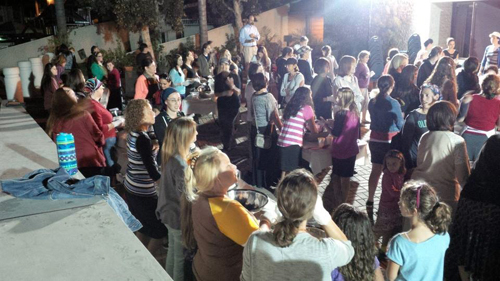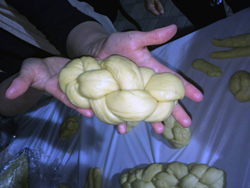
By Yisroel Weiser

SAN DIEGO — The scene in front of Beth Jacob San Diego felt big and electric. It looked like a movie premier. Big, because 175 women and girls had gathered to bake Challah and attend a multi-media class. Electric, in part, because two big flood lights illuminated the women’s outdoor workspace on the late October evening last Thursday the 23rd, but mostly because of the buzz and excitement in the air. The synagogue outdoor patio was transformed into a giant Mega Challah Make workspace. Beth Jacob Congregation launched the event in conjunction with its official partnership with the international Shabbos Project which took place October 23-25.
The workspace looked surgically pristine. The stone and concrete patio was well lit. White plastic covered tables crowned by large stainless steel bowls and pre-measured Styrofoam ingredient containers filled the patio. Indoors, a large video screen, chairs and refreshments were set up for multi-media viewing.
Back outside, women surrounded the tables. There were girls, young professionals, and grandmothers, all following the directions together to make the multi-millennial traditional dough. Some tables contained 3 generations of ladies taking part in the Challah bake together.
Sugar and yeast were poured into the bowls and then warm water was poured from clear glass pitchers making the yeast froth and come alive. The eggs, flour and salt were added, and, with 350 hands kneading, the dough took shape. Once the dough was formed, Challah was taken. Challah is a biblical mitzvah or commandment: “From the first of your dough you shall give to the LORD an offering throughout your generations” (Num:15:21). And so the generations did as commanded. They separated the Challah (the term for the small amount of dough consecrated and the finished baked product enjoyed by the bakers and their families) and made blessings on the mitzvah. The dough was then left to rise.
While the dough rose, Stephie Buchwald, a co-sponsor of the free event, (along with Beth Jacob and Lang’s Bakery) spoke dearly of her mother, Jeannette Rubinstein. Her mother too was a baker and this night was her first yarzheit (anniversary of her death). Video presentations by Rabbi Warren Goldstein, Chief Rabbi of South Africa, whose work launched the world-wide Shabbos Project, and Rebbetzin Saras Rigler, who spoke about her emotional connection to Challah baking uplifted the international nature of the event.
Alina Radashkevitch was at first ambivalent about the late hour, “I wasn’t sure if I was going to go with my girls or not. It would be late for them and they had school the next day. I had second thoughts. But when I arrived and got out of the car, everything looked so beautiful. There was something in the air I couldn’t explain… So spiritual, so special! And my girls had a great time too!”
The dough continued to rise as Beth Jacob Congregation’s Co-Youth Director, Malka Weiser, gave a class on the meaning behind the mitzvah of Challah. She spoke about the meaning of the word Challah and its Hebrew root “chol” translated as “ordinary” or “mundane.” Malka then went on to explain how Judaism was a chance to take the ordinary all around and grow, or elevate the mundane to something spiritual. As the Challah dough rose, as the night drew on, one-hundred and seventy-five women stood poised enjoying a lecture together. That late evening, one could feel the concept of ordinary rising to the spiritually extraordinary.
By the presentations’ end, the dough really filled out. What was once just powder, water, and yeast was now full-bodied, warm, fleshy dough. The participants split the dough between pairs, and then each lady divided her dough into “snakes.” These divisions only took a moment, for right after this, the snakes were braided together into the traditional Challah shape many recognize from their grandparents or from sweet family-round-the-Shabbat-table memories.
Guily Hanono said “ . . .it was a privilege participating …. I will try to continue making challot more frequently from now on, remembering Stephie’s mom, Jeannette Rubinstein.”
Participants went home with cards contained the blessings, recipe, and meanings behind the Challah making process. Some vowed to do the event again. Some, like Guily, committed to trying to make Challah each week. Other ladies, along with their families went further and committed to keeping a full halachik (in accordance with biblical and traditional Jewish law) Shabbos at home or at Beth Jacob along with the international commitment of the Shabbos Project.
Whatever the commitment, it was clear most women went home with a feeling of warmth and Jewish feminine unity to fill their homes, alongside the smell of freshly baked traditional Challah; Or as Alysa Kaplan succinctly put it, “I can’t tell you what an amazing time we had…. My house is smelling amazing right now …. we will see you this (Shabbos) weekend!”
*
Author Yisroel Weiser and his wife Malka are co-youth directors at Beth Jacob Congregation